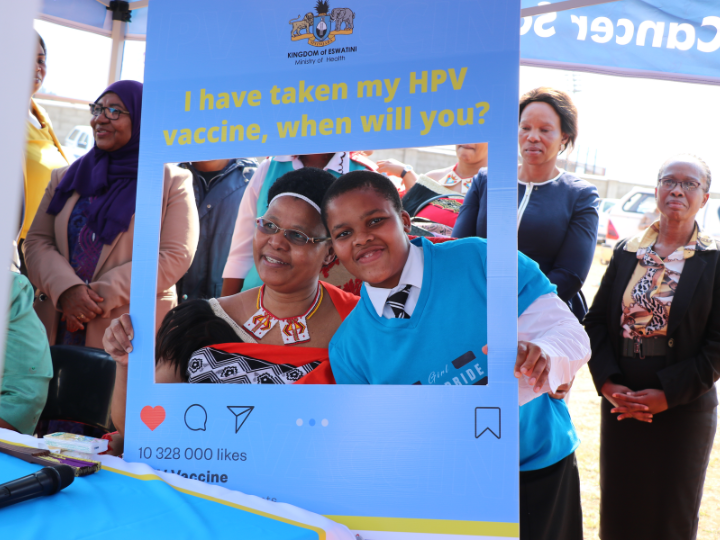Georgetown Faculty Share Research and Explore Collaborations on Global Cervical Cancer
In June 2025, the Global Cancer Collaborative, a joint initiative between the Georgetown University Global Health Institute and the Georgetown University Lombardi Comprehensive Cancer Center, hosted a seminar on cervical cancer. Three faculty members presented their current work, and attendees from across the university were invited to discuss new opportunities for interdisciplinary collaboration.

Cervical cancer is the fourth most common cancer among women worldwide, with nearly 90% of deaths occurring in low-and middle-income countries.
To learn about efforts to advance prevention, care, and access, the Global Cancer Collaborative invited three faculty members to present their work with communities across Central America, Sub-Saharan Africa, and South Asia.
Improving Access in Rural Guatemala
Cervical cancer is the second leading cause of cancer death among women in Guatemala.
While the Ministry of Health provides free screenings, only 64% of women report having ever been screened, and rates are significantly lower in rural Indigenous communities.
Recognizing this gap in care, Alejandra Hurtado de Mendoza, Ph.D., an associate professor at Georgetown Lombardi Comprehensive Cancer Center, co-led a pilot study with Paula Cupertino and Dejana Braithwaite to increase cervical cancer screening in Santa Catarina Palopó, a small rural town on Lake Atitlán.
“We partnered with women’s associations, midwives, health centers, the mayor’s office, the Ministry of Health, and non-governmental organizations,” she explained. “It was truly a community-engaged approach.”
Survey data from 247 participants showed that only 16% of eligible women reported ever receiving cervical cancer screening. Participants identified multiple barriers to screening, including distance to clinics, financial constraints, competing family responsibilities, and mistrust of the medical system.
With support from private foundations, Hurtado de Mendoza, Cupertino, and the research team developed community education workshops and trained midwives to support cervical cancer screening. The screenings were bundled with other services, such as prenatal care for pregnant women, to increase participation.
Hurtado de Mendoza hopes to expand the program’s reach to neighboring towns around Lake Atitlán and eventually across other rural areas in Guatemala.
Expanding Services in Eswatini
“Eswatini faces a dual burden of disease,” said Sharon Kibwana, Ph.D., assistant professor and senior program manager at the Center for Global Health Practice and Impact. “In addition to having one of the highest HIV prevalence rates in the world, the country also experiences some of the highest cervical cancer rates globally.”
The country’s incidence of cervical cancer is more than six times the global average, yet only one in four eligible women has been screened.
In partnership with the Ministry of Health, the Center for Global Health Practice and Impact works in 86 government-run health facilities to support HIV care and treatment services. These treatments include cervical cancer screening. Of the 86 facilities, 75 offer routine cervical cancer screening and 29 offer treatment services.
Over the past five years, more than 87,000 women living with HIV have been screened. These efforts have helped identify and treat precancerous lesions and refer women with suspected cancer to specialist care.
The team also supports the Ministry of Health’s efforts to provide human papillomavirus vaccination for girls ages 9 to 14. However, current funding for this work remains limited.
Confronting Stigma in India
Cecilia Van Hollen, Ph.D., a professor at the School of Foreign Service, spoke about the lived experiences of low-income and oppressed caste women with cervical cancer in Tamil Nadu, India.
One of the central findings of her book, Cancer and the Kali Yuga: Gender, Inequality, and Health in South India (2022), is the pervasive stigma surrounding cervical cancer.
“Cancer is widely perceived as a death sentence, associated with extreme pain and suffering,” Van Hollen said. “Cervical cancer carries added stigma due to its association with sexual transmission.”
In many cases, women feared being seen as immoral or impure, particularly in communities where caste-based discrimination intersects with gender and poverty. Participants described feeling ostracized by their families and communities, and some chose to self-isolate within their homes.
Van Hollen pointed to how gender roles often required women to prioritize the health of others before seeking care for themselves. In one case, a woman and her husband were diagnosed with cancer at the same time. The family chose to prioritize the husband’s treatment. By the time the woman received care two years later, her cervical cancer had progressed significantly.
Van Hollen recommended that global health policymakers and practitioners pay closer attention to the views and concerns of lower-income women in their efforts to prevent and effectively treat cervical cancer.
Opportunities for Collaboration
Following the presentations, Christopher Loffredo, Ph.D., director of the Office for Global Oncology and a professor of oncology and biostatistics, invited attendees to identify opportunities for collaboration.
“We need to pull together across Georgetown, those working on stigma, education, technology, and health systems,” Loffredo said. “That’s the kind of collaboration that can really move the needle.”
Several participants echoed this call, pointing to existing campus initiatives like the Georgetown-Lancet Commission on Faith, Trust and Health and the Global Maternal and Child Health Collaborative as examples of how faculty are already working across disciplines and regions.
Stay Connected
To get involved in the Global Cancer Collaborative and stay informed about future events, please fill out this interest form.
